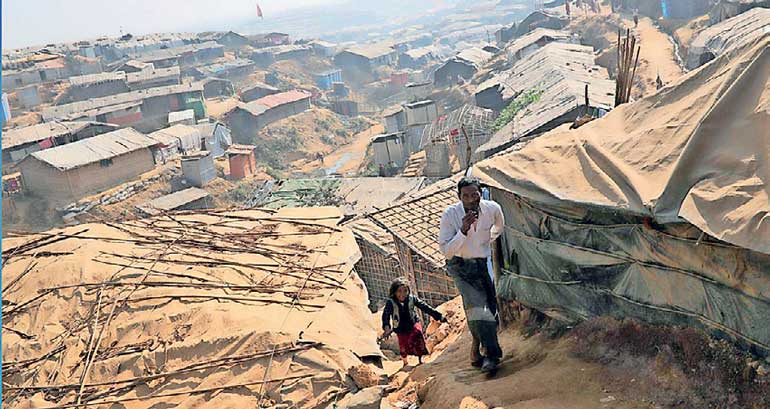Saturday Feb 21, 2026
Saturday Feb 21, 2026
Tuesday, 30 January 2018 00:00 - - {{hitsCtrl.values.hits}}

GENEVA (Reuters): More than 100,000 Rohingya refugees huddled in squalid, muddy camps in Bangladesh will be in grave danger from landslides when the mid-year monsoon season begins, a U.N. humanitarian report said.
There are now more than 900,000 Rohingyas in the Cox’s Bazar area of Bangladesh, after 688,000 fled violence in Myanmar that flared up in late August. Aid workers say the camps sheltering the new arrivals are completely inadequate. “Landslide and flood risk hazard mapping reveal that at least 100,000 people are in grave danger from these risks and require relocation to new areas or within the neighbourhoods that they live in,” the U.N. report said.
“The lack of space remains the main challenge for the sector as sites are highly congested leading to extremely hard living conditions with no space for service provisions and facilities. In addition, congestion brings increased protections risks and favours disease outbreak such as the diphtheria outbreak currently escalating in most of the sites.”
Although a rapid vaccination programme appears to have staved off the risk of cholera, 4,865 have confirmed, probable or suspected diphtheria, and 35 have died. The World Health Organization has vaccinated over 500,000 Rohingyas against diphtheria and on Saturday health workers began giving 350,000 children a second dose. The WHO also has 2,500 doses of anti-toxin, which is in short supply globally, to treat the deadly effects of the disease. But a new health concern has arisen – mumps. The U.N. report said there had been an increase in cases in the past few weeks, and Rohingya refugees and host communities had never been vaccinated against the highly contagious disease, which is rarely fatal but can cause complications such as meningitis.
Most of the Rohingya refugees – almost 585,000 – are in an overcrowded area called Kutupalong-Balukhali.